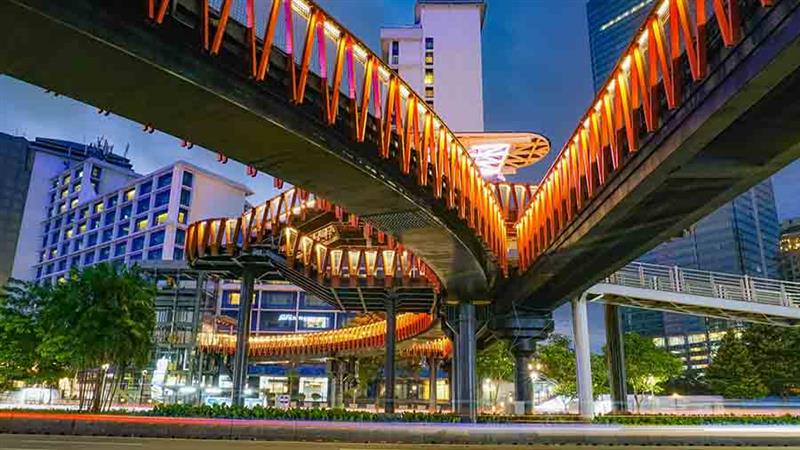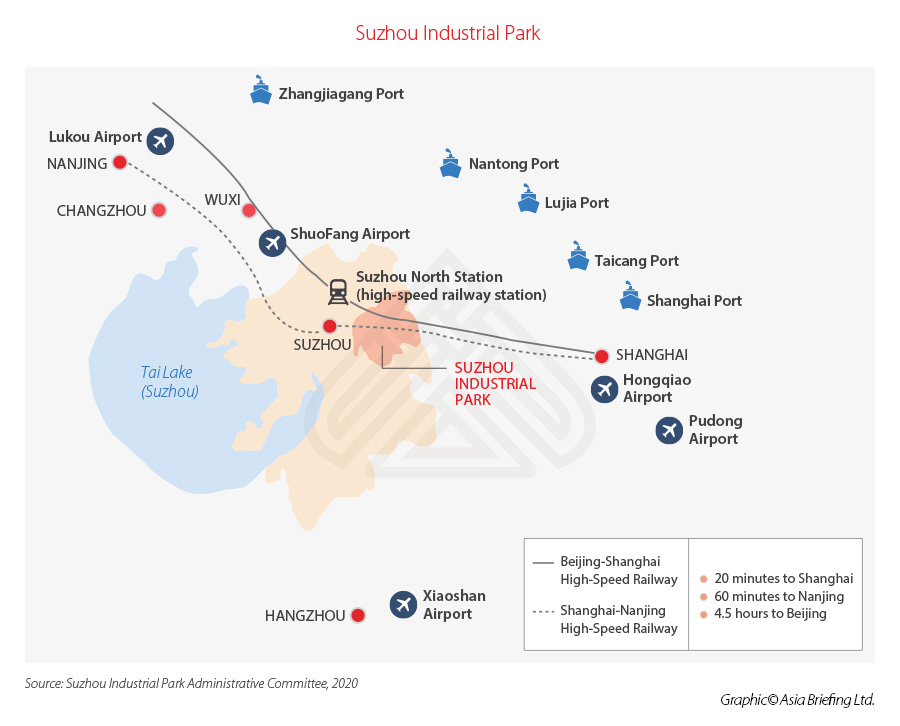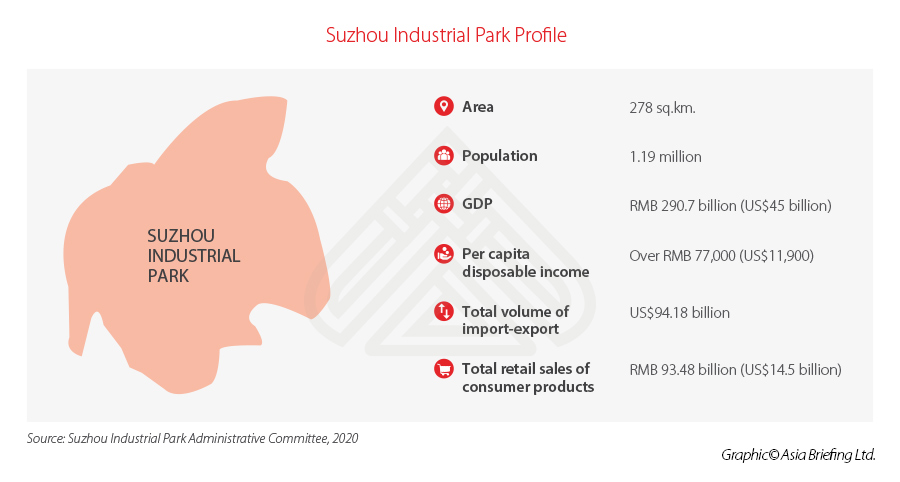Investing in Suzhou Industrial Park: A Brief Profile
In 2020, Suzhou Industrial Park (SIP) boasted 295 new foreign-funded projects and recorded 142 projects with increased capital investment. The actual utilized foreign capital also doubled in the SIP last year. Meanwhile, in terms of foreign trade, Suzhou ranks just behind Shanghai, Shenzhen, and Beijing.
In this first article of a two-part series, we profile the SIP and discuss why it has become such a popular destination for foreign direct investment in eastern China. Our follow-up article, in part two, will detail the SIP’s major incentives and favorable policies offered to enterprises and talents.
Suzhou Industrial Park (SIP), located in the eastern Suzhou city of Jiangsu province, is continuously being favored by foreign investors. Despite the COVID-19 pandemic, this tech-led industrial park saw substantial growth in its foreign direct investment (FDI) inflow – the actual utilization of FDI in the park reached a record high of US$1.97 billion in 2020, up by 100.6 percent compared with 2019; registered FDI reached US$3.52 billion, up by 81.4 percent year-on-year, according to the official data.
What makes Suzhou Industrial Park an attractive destination for foreign investors?
Suzhou Industrial Park was established in 1994 as a cooperative project between the governments of China and Singapore. As Suzhou’s largest industrial park, it covers a total jurisdiction area of 278 square kilometers (including the China-Singapore Cooperative Zone of 80 square kilometers).
It is located around Jinji Lake, a small fresh-water lake in eastern Suzhou, and is around six kilometers from the city center. The Suzhou area of Jiangsu Free Trade Zone, launched August 30, 2020 is mainly located in the Suzhou Industrial Park.
As a state-level economic and technical development zone (ETDZ), SIP boasted its No.1 ranking among 218 zones of its kind in China for five consecutive years (2016-2020) by the Ministry of Commerce based on the zone’s comprehensive development level.
SIP also ranked the first among ETDZs in terms of the annual import-export volume last year. The total imports and exports in SIP reached US$94.18 billion in 2020 – nearly one-third of Suzhou city’s total import-export volume. Suzhou’s total import-export volume reached US$322.3 billion in 2020, which makes it the fourth largest Chinese city in terms of foreign trade, only next to Shanghai, Shenzhen, and Beijing.
As a state-level high-tech zone, SIP’s ranking rose from fifth to fourth in 2020, after Beijing’s Zhongguancun Science Park, Shanghai’s Zhangjiang High-Tech Park, and Shenzhen High-Tech Industrial Park.
In 2020, SIP recorded a GDP of RMB 290.7 billion (US$45 billion). With over 1 million residents (of which 807,800 are permanent residents and 576,500 hold a Suzhou hukou) and a per capita disposable income over RMB 77,000 (US$11,900), the area’s total retail sales of consumer products reached RMB 93.48 billion (US$14.5 billion).
Major industries in Suzhou Industrial Park
From 1994 to early 2000s, with its low-cost labor, SIP successfully attracted a slew of foreign-funded enterprises (FIEs) to move their manufacturing there, which enabled the park’s steady industrialization.
Starting around 2005, the park began to upgrade its industrial ecosystem, focusing on fostering high-tech enterprises and developing a modern service industry. The Suzhou Industrial Park now focuses on six major industries, officially called the ’2+3+1’ industrial layout. They are:
- Two pillar industries – new generation information technology (NGIT) and high-end equipment manufacturing.
- Three emerging industries – biomedicine, nanotechnology application, and artificial intelligence (AI).
- One modern service industry.
Official data shows that in 2020, the total output value of the three emerging industries – biomedicine, nanotechnology application, and artificial intelligence (AI) – reached RMB 249.4 billion (US$38.4 billion), up by 22.9 percent.
Among them, the total output value of biomedicine exceeded RMB 100 billion (US$15.4 billion). Nearly 1,700 biomedicine-related enterprises are settled here. Besides, the output value of the integrated circuit industry reached RMB 40 billion (US$6.2 billion), an increase of 11 percent.
Pattern of foreign investment in SIP
Over the past two decades, SIP has attracted over 5,000 foreign-invested projects, including 156 projects invested by 92 Fortune Global 500 companies, and utilized US$32.3 billion of foreign investment.
It has attracted over 5,000 FIEs from 70 countries and regions, including some world-renowned brands like Bosch, Siemens, Samsung, BD, Wyeth, Philips, Fijutsu, and Johnson & Johnson. It also supported 309 Chinese enterprises to invest in 53 countries and regions.
More than 500 enterprises from home and abroad have set up R&D centers there. About 30 world-class educational and research institutions are operated jointly with foreign universities. The Oxford Suzhou Centre for Advanced Research, Harvard Weitz Innovation Hub, and other top scientific research institutions have settled in the park.
In 2020, SIP had 295 new foreign-funded projects and 142 projects with increased capital. Santen Pharmaceutical and Danaher set up R&D and manufacturing bases last year in SIP; Roche launched its new tissue diagnostics and reagents program; and Adidas kicked off the construction of Adidas Intelligent Operations Center in SIP.
Favorable policies incentivize businesses in target industries
To attract high-quality enterprises and talents, Suzhou Industrial Park has introduced a slew of unique favorable polices.
To boost the ‘headquarter economy’ in SIP, the Park offers cash rewards and rent subsidies to qualifying headquarter enterprises. Cash rewards and housing subsidies can also be provided to top or urgently needed talents working in the headquarter enterprise.
In addition, large amounts of subsidies and incentives will be given to enterprises in the R&D and operation stages of the three emerging industries, namely biomedicine, nanotechnology, and artificial intelligence.
For leading talents in entrepreneurship, support such as loan support, rent subsidies, and housing purchasing subsidies will be given. And, measures are being implemented to facilitate foreign talent’s entry, exit, and work in Suzhou.
In Part 2, we will discuss these favorable policies offered by the SIP in more detail. Businesses interested in investing in Suzhou Industrial Park can follow our coverage on China Briefing. Our parent company, Dezan Shira & Associates, recently opened its Suzhou office in the SIP. For more information, please email us at China@dezshira.com or Suzhou@dezshira.com.
About Us
China Briefing is written and produced by Dezan Shira & Associates. The practice assists foreign investors into China and has done so since 1992 through offices in Beijing, Tianjin, Dalian, Qingdao, Shanghai, Hangzhou, Ningbo, Suzhou, Guangzhou, Dongguan, Zhongshan, Shenzhen, and Hong Kong. Please contact the firm for assistance in China at china@dezshira.com.
We also maintain offices assisting foreign investors in Vietnam, Indonesia, Singapore, The Philippines, Malaysia, Thailand, United States, and Italy, in addition to our practices in India and Russia and our trade research facilities along the Belt & Road Initiative.
- Previous Article Belt and Road Weekly Investor Intelligence, #19
- Next Article The China Firewall Test: Which Websites are Blocked, and Does it Matter?





























